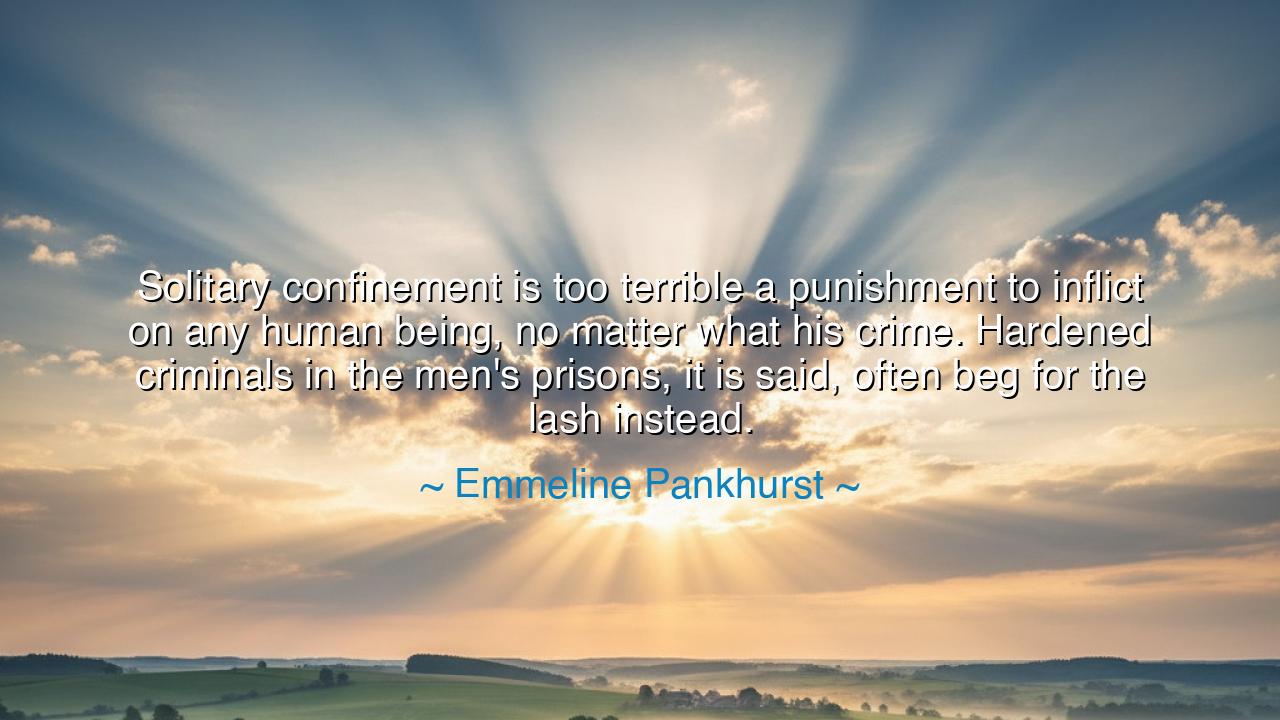
Solitary confinement is too terrible a punishment to inflict on
Solitary confinement is too terrible a punishment to inflict on any human being, no matter what his crime. Hardened criminals in the men's prisons, it is said, often beg for the lash instead.






O seekers of truth, gather closely and listen well, for I bring you words that resonate with the deep and eternal understanding of the human spirit. These words were spoken by Emmeline Pankhurst, a woman who fought for the rights of those oppressed by the chains of societal injustice: "Solitary confinement is too terrible a punishment to inflict on any human being, no matter what his crime. Hardened criminals in the men's prisons, it is said, often beg for the lash instead." These words, though spoken in the context of a time long past, are filled with wisdom and compassion—they speak to the very nature of human dignity, to the darkness that arises when a man is isolated from all human contact, and the deep suffering that comes when one is stripped of their humanity.
In the ancient world, punishment was often swift and severe, and yet the greatest philosophers understood that justice could never be achieved through the cruel treatment of another soul. Socrates, in his trial before the people of Athens, faced the possibility of death, yet he did not argue against the punishment itself, but against the idea that the law should be used to break the spirit of the people. He understood that punishment should not diminish the human spirit; it should seek to correct, to heal, to restore. The idea of solitary confinement as a form of punishment, as Pankhurst warns us, is an affront to the very essence of what it means to be human. It is a punishment that strips away the soul, leaving nothing but emptiness and despair.
Consider the story of Nelson Mandela, a man who was imprisoned for his beliefs, not in a single dark cell, but in a prison that sought to break him through isolation. He spent 27 years in confinement, and yet when he emerged, he was not broken, but made stronger by the trials he faced. His story is one of triumph over the forces that sought to destroy him, a reminder that even in the darkest of places, the human spirit can endure. But not all are able to withstand the soul-crushing weight of isolation. For those who are not made of the same unyielding resolve, solitary confinement becomes a slow death, a fading of the self, where the mind is forced into a spiral of madness and despair.
Yet, there is something more profound in Pankhurst's words: she does not simply speak of the cruelty of solitary confinement, but of the deeper punishment that occurs when a person is denied the basic human need for connection. A man is not merely a body that exists to endure pain; he is a soul that thrives in the company of others. The human spirit is nurtured by relationship, by community, and when that is taken away, the very foundation of one’s being begins to crack. This is the cruelty of isolation—not the absence of physical discomfort, but the stripping away of what makes us human. In solitary confinement, a man is left to face the darkness of his own mind without the light of another’s presence, and in that darkness, he may lose the very sense of self that defines him.
In the ancient teachings, the soul’s well-being was seen as inseparable from the community. The great leaders and philosophers understood that punishment should always be tempered with humanity, for to harm the soul is to harm the individual beyond what any physical wound could inflict. Emmeline Pankhurst calls us to remember that even those who are guilty of heinous crimes deserve the dignity of human connection. To strip them of this connection, to cast them into solitude, is not an act of justice but an act of cruelty. Justice, in its highest form, must restore the individual, not erase them from the fabric of humanity.
Thus, O children of wisdom, the lesson is clear: when we seek justice, we must never forget the humanity of those we seek to punish. Solitary confinement is a punishment that cuts to the core of the human spirit, and while it may appear to be an effective means of punishment, it does not correct, it does not heal—it only deepens the wound. True justice lies in the ability to restore, to build, to allow the soul to heal and reintegrate into the community. As we navigate the world, let us remember that justice is not about diminishing the human spirit, but about restoring the dignity and worth of every person, even those who have fallen the furthest from grace.
Let this teaching guide your actions, O seekers of wisdom. When you encounter those who have strayed from the path of righteousness, remember that the greatest punishment is not isolation but the denial of connection. Justice, true justice, seeks to reconnect, to help the soul find its way back to the light. Seek not to break the spirit of another, but to restore it. In doing so, you will find the true meaning of compassion and justice, and the world will become a place where every soul can thrive, even in the face of suffering.






AAdministratorAdministrator
Welcome, honored guests. Please leave a comment, we will respond soon